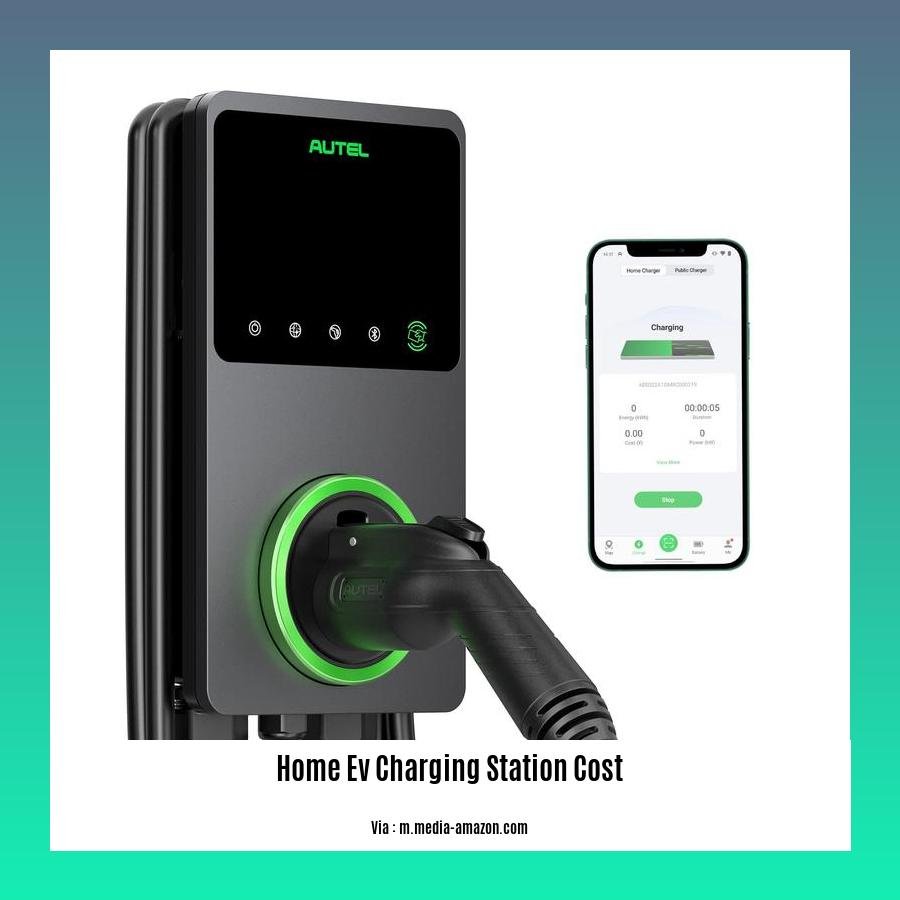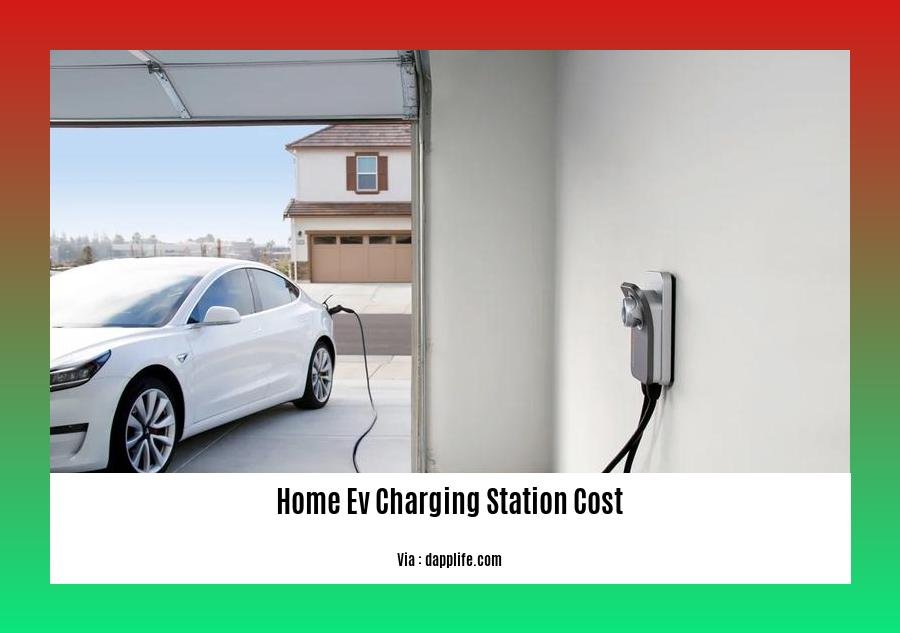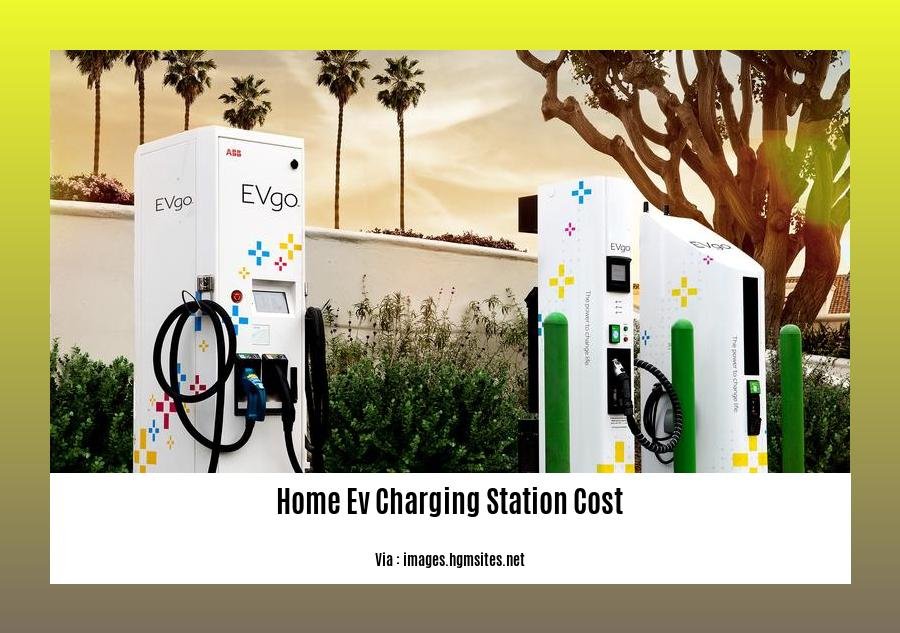Unveiling the Costs of Home EV Charging Stations: A Comprehensive Guide: Delve into the world of electric vehicle (EV) charging at home, exploring the financial implications and factors that shape the overall cost. From equipment selection and installation nuances to electricity rates and the intricacies of government incentives, this guide unravels the intricacies of home EV charging, empowering you with the knowledge to make informed decisions and embark on your sustainable energy journey.
Key Takeaways:
-
Installing an EV charging station at home typically costs between $750 and $2,600, including the charger and labor.
-
The charger itself typically ranges from $350 to $900, while labor costs for installation can vary between $400 and $1,700.
-
Tesla charger installation costs range from $500 to $1,200, excluding the Tesla Wall Connector, priced at $500.
-
EV advocacy organization Forth estimates installation costs between $300 to $1000, excluding hiring an electrician.
-
Level 2 chargers commonly used for home charging cost between $350 and $900, while advanced chargers for faster charging range from $550 to $2,000.
Home EV Charging Station Cost

Are you considering taking a step towards sustainable transportation? A home EV charging station might be the missing key. This guide delves into everything you need to know, including essential factors and cost estimates for a seamless transition to electric mobility at your home.
Factors Influencing the Home EV Charging Station Cost
-
Type of Charger:
-
Level 1 Chargers: Typically included with the EV, these are best suited for overnight charging and provide mild power.
-
Level 2 Chargers: The most common choice for home use, providing faster charging speeds and more power.
-
Level 3 Chargers: The fastest charging option, Level 3 chargers are usually found at public charging stations.
-
Installation Costs:
-
DIY Installation: If you’re handy and have electrical experience, you might be able to install a Level 1 charger yourself.
-
Professional Installation: For Level 2 and 3 chargers, hiring a qualified electrician is recommended for safety and proper functioning.
-
Electrical Upgrades:
-
Home Wiring: Older homes may require upgrades to handle the higher power needs of EV charging.
-
Local Permits and Inspections:
-
Local Regulations: Check with your local authorities for any permits or inspections you may need before installing.
-
Government Incentives:
-
Rebates and Tax Credits: Many states and municipalities offer incentives such as rebates or tax credits to promote EV usage.
How Much Does a Home EV Charging Station Cost?
The total home EV charging station cost varies depending on several factors discussed above. Here’s a cost breakdown:
-
Charger Cost:
-
Level 1 Chargers: $100 – $500
-
Level 2 Chargers: $350 – $1000
-
Level 3 Chargers: $5000 – $20000
-
Installation Costs:
-
Level 1 Chargers: $100 – $300 (DIY)
-
Level 2 Chargers: $400 – $1500 (Professional)
-
Level 3 Chargers: $2000 – $10000 (Professional)
Cost-Saving Tips
-
Research Government Incentives: Look into local and federal programs that provide rebates or tax credits for EV charging station installation.
-
Choose the Right Charger: Consider your daily driving needs; a more powerful Level 2 charger may not be necessary if you have lower mileage.
-
Explore DIY Installation: If you’re comfortable with electrical work, installing a Level 1 charger yourself can save you money on professional fees.
-
Shop Around and Compare: Obtain quotes from multiple electricians or contractors to find the best deal.
-
Consider Off-Peak Charging: Many utilities offer discounted rates for electricity during off-peak hours, reducing your charging costs.
Remember that the initial investment in a home EV charging station can lead to long-term savings on fuel and reduce your carbon footprint, contributing to a greener future.
-
If you’re looking for a home equity loan without the hassle of income verification, look no further than our home equity loan with no income verification.
-
Searching for a home equity loan without income? Our home equity loan without income might be the perfect solution for you.
-
For more information on our home essentials, you can reach out to our customer support team at our home essentials contact number.
-
Know more about the home EV charging station price and find the right one for your home.
Benefits of installing a home EV charging station

Hey everyone, in the pursuit of driving green and keeping your carbon footprint at bay, you might be considering joining the electric vehicle (EV) revolution. And rightfully so! With the convenience and cost-saving benefits of owning an EV, the only question left is, “Where do I charge this futuristic ride?” The answer? Your very own home, of course!
Benefits of installing a home EV charging station:
-
Convenience at your fingertips: Picture this: you come home after a long day, plug in your EV, and let the magic of electricity work its wonders overnight. No more hunting for charging stations, waiting in queues, or battling with strangers for a spot. Simply plug in, relax, and wake up to a fully charged vehicle, ready to conquer the roads again. It’s like having your own personal gas station, but better!
-
Cost Savings: Did you know that charging your EV at home can save you up to 5x less compared to public charging stations? Home charging is like having your own personal fuel pump, where you set the prices. Take advantage of off-peak energy rates, schedule charging during the night, and watch those energy bills shrink. It’s like getting a secret discount on every charge, making your EV even more affordable to operate.
-
Increased Home Value: Who doesn’t love a property that’s future-ready? Installing a home EV charging station is like putting a “Green Approved” stamp on your home. Potential buyers, especially eco-conscious ones, will be drawn to the convenience and value of having a dedicated charging spot right at home. It’s like adding a sparkling gem to your property’s crown.
-
Environmental Benefits: By owning an EV and charging it at home, you’re playing a part in reducing your carbon footprint and contributing to a cleaner environment. Every time you plug in, you’re saying no to harmful emissions and yes to a greener future. It’s like giving Mother Nature a big, warm hug with every charge.
Key Takeaways:
- Home EV charging stations offer unmatched convenience, allowing you to charge your vehicle overnight without leaving the comfort of your home.
- Charging at home can save you up to 5x less compared to public charging stations, making it a cost-effective solution.
- Installing a home EV charging station can increase the value of your property, making it more attractive to eco-conscious buyers.
- Owning an EV and charging it at home contributes to a cleaner environment by reducing your carbon footprint and promoting sustainable transportation.
Relevant URL Sources:
- 10 Benefits Of Installing EV Charging Station At Home
- Everything You Need to Know About Charging an EV at Home
Factors affecting the cost of installing a home EV charging station:
The transition to electric vehicles is gaining momentum, and having a charging station at home is becoming increasingly desirable for EV owners. The cost of installing a home EV charging station can vary, influenced by several factors. Let’s dive into these factors and help you make an informed decision.
Type of EV charger:
The type of EV charger you choose is a significant factor in determining the installation cost. There are three main types:
-
Level 1: These chargers come with most EVs and plug into a standard household outlet. They offer slow charging speeds, taking up to 10 hours or more for a full charge.
-
Level 2: Level 2 chargers are more powerful than Level 1 and can fully charge most EVs in 4-8 hours. They require a dedicated circuit and professional installation.
-
Level 3: These chargers are the most powerful and can provide an 80% charge in as little as 30 minutes. However, they are also the most expensive and require specialized equipment and installation.
Location of the charging station:
The location of your charging station also plays a role in the installation cost. If you want it installed outdoors, additional weatherproofing and protection measures may be necessary, raising the overall cost.
Electrical panel upgrade:
Installing a home EV charger may require an electrical panel upgrade if your current one can’t handle the increased electrical load. The cost of this upgrade will depend on the size and complexity of your electrical system.
Permits and inspections:
Local regulations may require permits and inspections for installing a home EV charging station. The cost of these varies depending on your location.
Labor costs:
The cost of labor for installing a home EV charging station can vary widely depending on the complexity of the installation, the experience of the electrician, and local labor rates.
Additional considerations:
-
Government incentives: Check with your local government and utility companies for potential rebates or incentives that can reduce the cost of installing a home EV charging station.
-
Energy rates: Consider your electricity rates when deciding on the charging time. Charging during off-peak hours can save you money.
-
Future-proofing: If you plan on getting a more powerful EV in the future, consider installing a Level 2 charger now to avoid the need for an upgrade later.
Key Takeaways:
-
The type of EV charger, location, electrical panel upgrade, permits, and labor costs all contribute to the total installation cost.
-
Level 2 chargers are a popular choice for home use, offering faster charging speeds and reasonable costs.
-
Check local regulations for any required permits and inspections.
-
Consider government incentives and off-peak charging rates to save money.
-
Installing a Level 2 charger now can future-proof your home for more powerful EVs.
Citation:
- Factors That Impact EV Charger Installation Costs
- The Factors That Influence The Cost Of EV Charging Stations at Retail Stations
Incentives and rebates available for home EV charging stations
Going green and joining the electric vehicle revolution has multiple benefits, but one concern for many is the cost of installing a home EV charging station. Fear not, as you can ease the financial burden with exciting incentives and rebates available.
Key Takeaways:
- Take advantage of the generous 30% federal tax credit for home EV charging station installation.
- Discover valuable state and regional incentives that can further reduce your costs.
- Explore utility companies’ rebate programs for additional savings.
- Check with your local government for grants or programs that support EV adoption.
Let’s dive into the details:
Federal Tax Credit:
- The U.S. government offers a 30% tax credit for the installation of EV charging stations at home.
- This credit is available for up to $1,000 of the total cost of the charging station and installation.
- To claim the credit, you must file Form 8911 with your federal income tax return.
State and Regional Incentives:
- Many states and regions offer additional incentives for the installation of home EV charging stations.
- These incentives can include rebates, grants, and tax credits.
- The amount of the incentive and the eligibility requirements vary from state to state.
- Be sure to check with your state and local government to see what incentives are available in your area.
Utility Company Rebates:
- Some utility companies offer rebates for the installation of home EV charging stations.
- The amount of the rebate and the eligibility requirements vary from utility to utility.
- Contact your utility company to see if they offer a rebate program for home EV charging stations.
Local Government Grants and Programs:
- Some local governments offer grants or programs that support the adoption of electric vehicles.
- These programs can include financial assistance for the installation of home EV charging stations.
- Contact your local government to see if they offer any programs that can help you save money on the installation of a home EV charging station.
Citation:
- How To Get The Federal EV Charger Tax Credit
- Federal Tax Credit for EV Chargers
FAQ
Q1: What are the major cost factors associated with installing an EV charging station at home?
A1: The primary cost factors include the type and number of charging ports, the location of the charging station, the amount of power required for charging, government incentives and rebates, and installation and labor costs.
Q2: What is the average cost range for installing a Level 2 charging station at home?
A2: Typically, Level 2 home charging stations can cost between $200 and $1000, excluding installation costs. The total cost, including installation, can range from $750 to $2,600, depending on various factors.
Q3: How much does it cost to install a Tesla charger at home?
A3: The cost of installing a Tesla charger typically ranges from $500 to $1,200, excluding the Tesla Wall Connector, which itself costs $500. It’s important to note that these prices do not include the cost of hiring an electrician.
Q4: Are there any government incentives or rebates available to offset the cost of installing a home EV charging station?
A4: Yes, the federal government offers a tax credit of 30% of the hardware and installation costs, up to a maximum of $1,000 for EV chargers installed at homes in 2022. Additionally, many states and regions provide their own incentives and rebates, which can vary depending on the location.
Q5: What are some of the benefits of installing an EV charging station at home?
A5: The benefits of installing an EV charging station at home include convenience, cost savings due to lower charging costs compared to public charging stations, the ability to charge during off-peak hours for cheaper energy rates, potential increase in home value, and environmental benefits from using a renewable energy source.
- Does Ammonia Kill Mold? The Truth About Using It for Removal - April 15, 2025
- Does Bleach Kill Spiders? Effectiveness, Safety, and Better Alternatives - April 15, 2025
- Does Soap Expire? How to Tell if Your Soap Has Gone Bad - April 15, 2025










